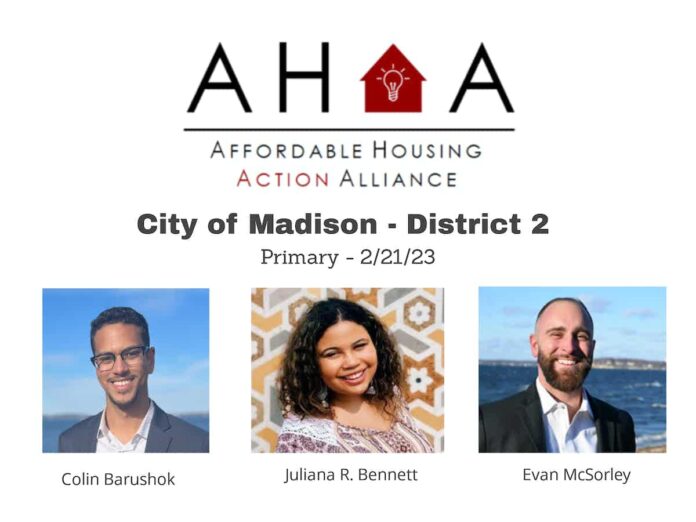While all the candidates say that affordable housing is a priority, read here to find out what they say they will do about it!District 2 has a primary on Tuesday, February 21, 2022. Here’s a map of district 2, here’s where you find out where to vote. And here’s the candidates on affordable housing! All candidate answers can be found here.
- The City of Madison continues to put money into affordable housing, but we can’t develop affordable housing fast enough or in a large enough quantity for people with incomes that are at or below 30% of the Area Median Income (AMI). What new ideas would you bring to the table to assist us in getting more affordable housing for people at or below 30% AMI?
 Colin Barushok – no response
Colin Barushok – no response
 Julianna Bennett
Julianna Bennett
Currently, the City of Madison is in an affordable housing crisis. Still the direction from the mayor’s office is to build new housing, regardless of the affordability level, with this idea that more density will drive down costs. This is only partially true. For example, the downtown area grew by 6000 residents in the past 10 years with the influx of luxury high rise developments and yet rents are still increasing. I believe that yes we should encourage density, but we should also encourage deeper affordability to meet that 30% AMI range. For example, any city-owned property development (such as the Lake St Campus Garage) should provide housing at 30% AMI. We should further increase funding to our land-banking fund so that we can build more publicly-funding affordable housing.
 Evan McSorley
Evan McSorley
I believe the City should take a serious look at purchasing natural occurring affordable housing and keeping it permanently affordable. I’d like to work with staff to figure out how best to accomplish this, but with tools like the Madison Community Development authority, I believe it can be accomplished. Expanding city-controlled affordable housing isn’t sufficient in the near term, though.
- Much of the affordable housing that is currently being built in our area is Section 42 tax credit housing in which the Area Median Income (AMI) is used to determine rent amounts. And because the AMI is so high in Dane County the rent for many of the units ends up being close to market rate. What can we do to make sure that the affordable housing we build ends up being affordable enough to reach lower incomes? Should Section 42 developments that receive city funding be required to have more units affordable for those at or below 30% of AMI than they do now?
 Colin Barushok – no response
Colin Barushok – no response
 Julianna Bennett
Julianna Bennett
As mentioned before, we should increase funding to land-banking. We should also maximize the usage of our affordable housing fund and open up our city TIF policy to also more developers, especially BIPOC developers, build deeper affordable housing. I believe that the question about Section 42 housing can fall outside of the realm of what the City of Madison actually can do given the constraints from the state legislature on local governments. That is why it is all the more important that the city utilizes funding sources such as our affordable housing fund, land-banking, and TIF to create more units at or below 30% AMI.
I believe that a valid question the city needs to grapple with is if we should prioritize broader or deeper affordability. Funding sources, such as WHEDA, provides resources to developments that have a mix anywhere from 30%-120% AMI. To them, housing that reaches 60%-120% AMI is affordable. Personally, I don’t believe that is the case and affordable housing means anything at or below 30% AMI. Still, the City of Madison should come to a clear definition of affordable housing so that we can strategically plan where to allocate resources. I am happy to work with AHAA on coming to a city-wide definition of affordable housing.
 Evan McSorley
Evan McSorley
The City should incentivize developers to increase affordable housing units within their building beyond the short term TIF agreements currently be used. I support legislation aimed at putting a rent cap on specific units for longer periods of time. For example, a building with 100 units is built with 20 of those units recognized as affordable housing. Based upon initial support and funding from the city, those units will remain price capped for a 10-year time period before being re-evaluated and adjusted with the current market. Section 42 developments that currently receive city funding should be required to maximize affordable housing units.
- We need more nonprofit developers who are willing to build affordable housing and keep it affordable for longer periods of time. What can we do to get more nonprofit developers in our community and support their growth and success?
 Colin Barushok – no response
Colin Barushok – no response
 Julianna Bennett
Julianna Bennett
Again, the main thing the city can do is to provide long-term support. Granted the city gets better interest rates on lending, we could use our lending services to nonprofits for long-term affordable housing. Furthermore, I have seen on council how our grant allocation process is often inequitable and divisive. I am committed to creating a grant allocation process for nonprofits that is fair and does not pit nonprofits against each other. All in all, I believe that the long-term growth and success of nonprofits needs to be a discussion in conjunction with city staff and nonprofits. Nonprofit voices should be centered in the equation of how we can best support them.
 Evan McSorley
Evan McSorley
The Council should work with the mayor and with city staff to apply for federal funds in order to support new non-profits aimed at building affordable housing in Madison and in the surrounding area. We must continue to support new developments in surrounding areas such as Sun Prairie, Middleton, Verona and Fitchburg in addition to downtown Madison.
- Most affordable housing is only affordable for a period of 40 years or less, meaning our investment in affordable units is lost after a set time. Please discuss any ideas that you have for keeping affordable housing in Madison affordable long-term?
 Colin Barushok – no response
Colin Barushok – no response
 Julianna Bennett
Julianna Bennett
Providing permanent affordable housing is tricky, especially because most affordable housing developers obtain funding through low income housing tax credits (LIHTC), which generally expire after 15 years with the option to extend to 30 years. This is why it is important for the City of Madison to optimize our controls of zoning and land use to create permanent affordable housing. For example, a few years ago the city created a permanent land use restriction agreement (LURA) for a development on Park St with Mocin’ Out. In times where the city can use LURA to create permanent affordable housing, we should. The city should also look towards our land-banking and affordable housing fund policies to include language that stipulates providing permanent affordable housing to receive the funding.
 Evan McSorley
Evan McSorley
The Common Council should work to identify sites where it can purchase land and hold it (called land banking) until it can be developed by a community land trust, such as the Madison Area Community Land Trust. A land trust is essentially a non-profit that owns the land underneath a house that you own, and upon sale you take some profits and the rest go to keeping the home affordable for future generations. This is a good way to provide both affordable housing and wealth building opportunities that are financially self-supporting long term. In addition, I believe the Council should continue to support direct support programs that assist home ownership, such as down payment assistance.
- Tenants in the city and county have had access over the last couple of years to eviction prevention and security deposit funds thanks to the federal government’s COVID relief funding. These funds – the CORE program – likely will end in 2023. Do you think the city should prioritize providing more funds once the COVID money ends and if so, please give some ideas of sources of funding?
 Colin Barushok – no response
Colin Barushok – no response
 Julianna Bennett
Julianna Bennett
I have personally utilized resources from Dane Core programming, when I received an eviction notice. Thus, I understand the significant value such programs bring to our communities and I am committed to finding permanent funding sources to keep these programs running. When re-elected, I will push forward an initiative to provide grants and zero-interest micro loans to tenants that need emergency rental assistance. I will also work within the relationships I have built with Dane county supervisors to ensure that their budgets include funding for the Dane CORE program. Ultimately, funding this program should be a partnership between the city, county, and service providers. Bridging this gap to provide ongoing funding is one of my top priorities once re-elected.
Beyond the Dane CORE program, I regularly connect residents to already existing programs that support tenants facing eviction. Such services include the Tenant Resource Center, the COmmunity Action Coalition, Urban Triage, and the UW Law School Eviction Defense Clinic. The problem I have noticed with providing eviction services is (1) residents need to know that these programs exist, and (2) these programs need additional funding to hire staff to help distribute more resources faster. When re-elected, I will work within the budget of the Community Development Division to increase such resources.
 Evan McSorley
Evan McSorley
As a council, we will need to review and apply for other Federally offered programs to provide cash assistance to those in immediate need of help and consider providing matching city dollars.
- Are there any changes that the city could make – zoning requirements, paperwork, etc. – that could make affordable housing development and operation easier and more attractive to nonprofits and businesses, and also less burdensome for tenants who have to complete a lot of paperwork and meet reporting requirements?
 Colin Barushok – no response
Colin Barushok – no response
 Julianna Bennett
Julianna Bennett
First off, I am committed to continue working on streamlining the development process. As an Urban Design Commission (UDC) member, I was flabbergasted by a recent debate where UDC members voted against a new development that would provide 550 units of workforce housing for arbitrary reasons. I was the only commissioner that spoke in favor of the development, because of the benefits it would provide our city. When re-elected, I will actively seek opportunities to streamline the development process, specifically for developments that provide affordable housing.
I also strongly believe that the City of Madison should continue upzoning in areas where we can. This is the reason why I supported upzoning for missing middle housing and transit oriented development overlay.
As for paperwork, we should make the process less cumbersome for tenants. For example, it would be great if we could not have a landlord portion on emergency rental assistance applications, because landlords often slow that process down. Still, much of the paperwork requirements are set by the state and/or federal agencies, not by the city. Hence, it is all he more important that the city connects residents to community nonprofits who can help them navigate the paperwork and reporting system.
 Evan McSorley
Evan McSorley
The city can incentivize new affordable housing developments by fast tracking these projects, giving them priority for city committee, related requirements.





